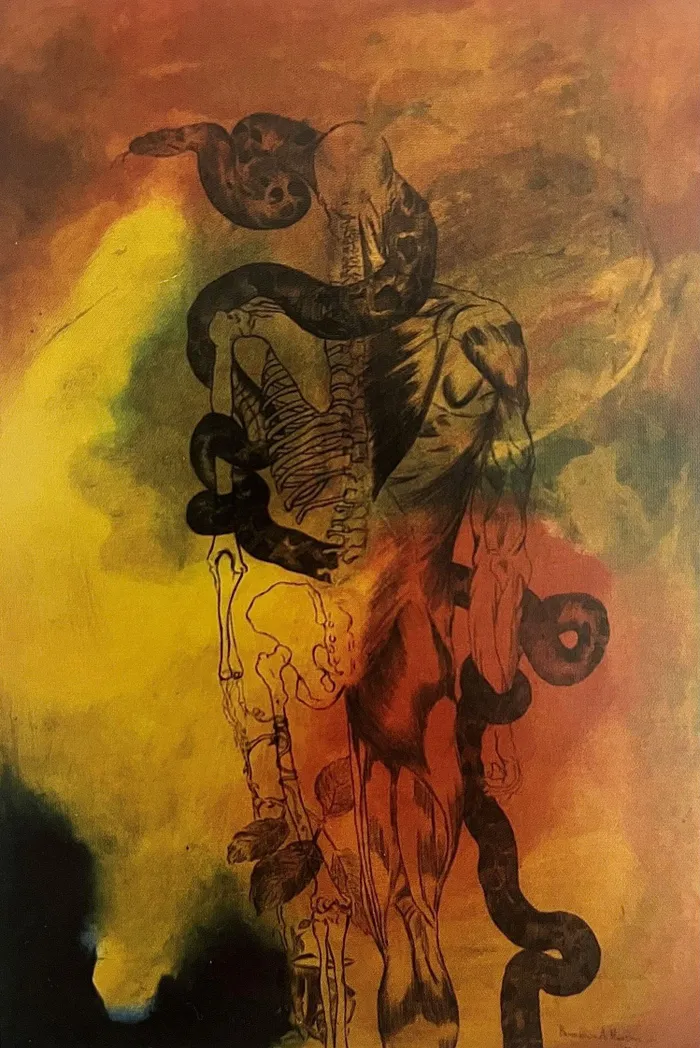Cultural heritage takes centre stage at the G20: The Ifa Lethu Foundation's 'Still We Rise' exhibition

Dikobe Ben Martins, 'Apartheid Kills,' 1974 (Ifa Lethu Art Collection)
Image: Supplied
As South Africa assumes the Presidency of the G20, the Ifa Lethu Foundation has positioned cultural heritage as a strategic pillar of sustainable development, diplomacy and inclusive economic growth. Its landmark exhibition, ‘Still We Rise’, presented in partnership with the SABC at the Atrium, Keyes Art Mile, offers a compelling cultural counterpoint to the global policy discussions taking place in Johannesburg. Running until 23 November and coinciding with key G20 engagements – including the W20 Ministerial meeting and the visit of Australian Prime Minister Anthony Albanese – the exhibition demonstrates how heritage can be leveraged as a tool for economic resilience, social cohesion and international cooperation.
Cultural Heritage as a G20 Imperative
The G20’s priorities – resilient economies, sustainable development and inclusive futures – depend not only on economic frameworks but also on the cultural foundations that shape societies. Ifa Lethu argues that cultural heritage must be integrated into global development agendas, particularly across the Global South, where heritage is deeply connected to climate justice, youth opportunity, tourism and post-conflict recovery.
‘Still We Rise’ places South Africa’s cultural voice firmly within this global context. The exhibition showcases art created under apartheid oppression, including works made in exile and repatriated decades later. By foregrounding memory, resistance and resilience, it underscores how culture becomes a vehicle for societal healing and how the arts can support job creation, entrepreneurship and sustainable cultural tourism – key G20 development themes.
‘Still We Rise’: A Cultural Narrative for the G20 Moment
Borrowing its title from Maya Angelou’s iconic poem, ‘Still I Rise’, the exhibition reframes the phrase as a collective declaration – ‘Still We Rise’. It honours artists who continued to create despite censorship, violence and displacement. For international delegates arriving in Johannesburg, it provides an alternative narrative of South Africa: not one defined by contemporary challenges, but one illuminated by creative resilience and cultural ingenuity.
“This is a story of South Africa told through the eyes of artists who were silenced at home but found recognition abroad,” says Dr Narissa Ramdhani, Director of the Ifa Lethu Foundation. “As we welcome the world for the G20, we want visitors to understand South Africa beyond the headlines.”
The exhibition also marks the beginning of Ifa Lethu’s 20th anniversary celebrations, which will continue through 2026 with heritage-led development programmes, a Creative Digital Ecosystem and new global partnerships across India, the United States, the Nordic region and Chile.
Ifa Lethu’s Repatriation Model: Diplomacy in Action
Founded in 2005 through a partnership between South Africa and the Australian Government, Ifa Lethu has become the country’s largest heritage repatriation organisation, returning over 550 artworks from 16 countries. The Foundation originated from the activism of two Australian diplomats, Diane Johnstone and Bruce Haigh, who defied apartheid restrictions in the 1970s and 80s to host township art exhibitions and collect works that might otherwise have been lost. Their collections became the nucleus of the Ifa Lethu Heritage Collection.
This history demonstrates a powerful form of cultural diplomacy – an ethos the G20 increasingly recognises as essential in a fragmented geopolitical landscape. Ifa Lethu extends this diplomacy by using heritage to build soft-power bridges, facilitate dialogue and foster mutual understanding beyond state-centric negotiations.
Culture as a Driver of Inclusive Development
Beyond repatriation, Ifa Lethu invests in creative entrepreneurship, human rights education and youth economic empowerment. More than 2,400 young people have been trained to develop creative enterprises, leading to over 800 small businesses established in rural and township communities. These initiatives align directly with the G20’s commitment to inclusive growth, recognising cultural industries as high-potential sectors for job creation and local economic development.
Heritage, for Ifa Lethu, is not static preservation; it is an engine for sustainability. The organisation is increasingly focused on climate-vulnerable heritage sites, advocating for climate finance to support conservation – a priority echoed in current G20 discussions on adaptation and resilience.
Preserving Memory, Expanding Voice
The SABC Art Collection, central to the exhibition, represents one of South Africa’s most significant public art holdings. Its post-1994 acquisition strategy corrected historic imbalances by foregrounding Black artists whose voices were suppressed under apartheid. Curator Koulla Xinisteris describes the collection as a “lineage of feeling, thinking, making and resisting,” one that embodies South Africa’s ongoing struggle for justice and equality.
By partnering with the SABC, Ifa Lethu highlights public institutions’ vital role in safeguarding cultural memory – another theme increasingly relevant to G20 conversations on social cohesion and democratic resilience.
A Legacy of Global Partnerships, Led by Australia
No international partner has shaped Ifa Lethu’s growth more deeply than Australia. From the 1960s to the present, the Australian High Commission has supported South African artists, facilitated repatriation, and provided seed and project funding – most notably the R4 million investment from BHP Billiton that helped establish the Foundation. Successive Australian High Commissioners, ministers and public figures, including the late Prime Minister Malcolm Fraser, championed the cause, encouraging collectors worldwide to return South African artworks.
This enduring partnership exemplifies the G20’s spirit of cooperation and shows how cultural diplomacy can produce long-term developmental impact.
A Message to the G20 and the World
‘Still We Rise’ arrives at a moment of global uncertainty – marked by conflicts, inequality and environmental stress. The exhibition stands as a reminder that cultural heritage is not a peripheral concern but a stabilising force in turbulent times. It connects people across borders, inspires ethical leadership and reinforces a shared humanity.
“This is not a narrative of struggle but one of triumph,” says Dr Ramdhani. “It shows a nation that has survived, adapted and continues to create – and that is a message we are proud to share with the world.